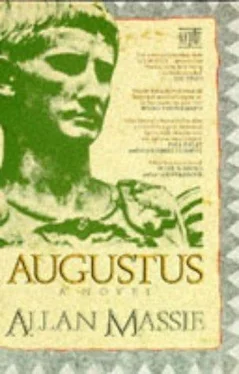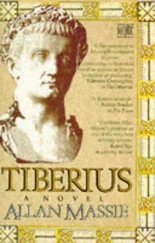Allan Massie - Augustus
Здесь есть возможность читать онлайн «Allan Massie - Augustus» весь текст электронной книги совершенно бесплатно (целиком полную версию без сокращений). В некоторых случаях можно слушать аудио, скачать через торрент в формате fb2 и присутствует краткое содержание. Жанр: Исторические приключения, на английском языке. Описание произведения, (предисловие) а так же отзывы посетителей доступны на портале библиотеки ЛибКат.
- Название:Augustus
- Автор:
- Жанр:
- Год:неизвестен
- ISBN:нет данных
- Рейтинг книги:4 / 5. Голосов: 1
-
Избранное:Добавить в избранное
- Отзывы:
-
Ваша оценка:
- 80
- 1
- 2
- 3
- 4
- 5
Augustus: краткое содержание, описание и аннотация
Предлагаем к чтению аннотацию, описание, краткое содержание или предисловие (зависит от того, что написал сам автор книги «Augustus»). Если вы не нашли необходимую информацию о книге — напишите в комментариях, мы постараемся отыскать её.
Augustus — читать онлайн бесплатно полную книгу (весь текст) целиком
Ниже представлен текст книги, разбитый по страницам. Система сохранения места последней прочитанной страницы, позволяет с удобством читать онлайн бесплатно книгу «Augustus», без необходимости каждый раз заново искать на чём Вы остановились. Поставьте закладку, и сможете в любой момент перейти на страницу, на которой закончили чтение.
Интервал:
Закладка:
I could not bring myself to see my daughter, though Livia reported her to be penitent. She had hurt me too deeply. Livia suggested that she be required to live on one of my country estates, but I knew that she would soon resume her former way of life in such circumstances. When a woman has once become a whore, no reform is possible; she is like a dog which has turned to killing sheep. I therefore determined that her exile should be more complete, and banished her to the island of Pandataria. I ordered that she should not be permitted to drink wine, but this command was not intended primarily as a punishment. Julia was in danger of becoming an habitual drunkard, and I believed that compelled to abstain from wine she might come in time to review her conduct and arrive at a correct judgement of her behaviour. For obvious reasons I also ordered that she be denied male company.
I have never seen her since, though some years ago, learning that her quiet and narrow life had indeed had some of the consequences for which I hoped, I permitted her to live on the mainland of Italy, at Reggio Calabria.
Julia's beauty and charm had always made her popular with the Roman people. When they received the news of her sentence, a deputation approached me begging that I rescind it and permit her to return to Rome. I read in their faces a condemnation of what they judged to be my harshness; they pitied Julia, careless of how she had wounded me. I put an angry stop to their nonsense.
'If you ever bring up this matter again,' I said, 'may the Gods curse you with daughters as lecherous as mine, and with wives as adulterous as Julia.'
TWELVE
It was painful writing that chapter about Julia's disgrace, and when I had at last brought myself to do so, I sickened of this memoir. It felt as if the bile deposited by that episode had collected itself in a ball, and made it impossible for me to continue. I laid the task aside, and only resume it now, in this the seventy-seventh year of my life because I hate things to be incomplete, and because death now stares me in the face. It is necessary to make some kind of summing-up, and to ask myself to judge how I have played my part in this comedy of life.
A painful comedy, where promise is so often dulled, and where the Gods work with a keen and cruel irony.
I could not help myself blaming Tiberius for his part in Julia's disgrace, even though in my heart I knew that he had fled to Rhodes because he was as disgusted by her behaviour as I was to be, and because he knew that he was impotent to control her. Nevertheless, it seemed to me in my misery that he had abdicated his domestic responsibility as completely as his responsibility as a servant of the Empire, and, so, when the term of his tribunician power expired, I saw no reason to renew it. Let him crumble in Rhodes, I said to myself, let him taste leisure.
He was himself alarmed by this lapse in his nominal authority, or perhaps he had become bored with his narrow life on the island. At any rate he now wrote to me requesting permission to return to Rome:
'Now that my stepsons, Gaius and Lucius, are full-grown and taking their places with distinction in the government of the Empire,' he wrote, 'I may say clearly that my principal reason for retiring from public life, apart from weariness, and the long fatigue of service on the harsh frontiers of Empire, was to avoid the suspicion of any rivalry with them. But, since they are now acknowledged as the heirs to the Principate, that reason is no longer valid, and I am anxious to return to the city if only to visit my family, whom I sorely miss, and in particular to be whatever comfort I may be to my beloved mother and you, my gracious stepfather, in your old age.'
Tiberius has no gift for correspondence. This letter seemed to me as insolent as that in which he had announced his desire to settle on Rhodes. My reply was brief:
'It was of your own choice that you settled on Rhodes, against my will, denying me your help. You had better remain there and abandon all hope of visiting your family, whom you were so eager to desert. Your mother is in excellent health…' In fact, Livia was also keen that Tiberius should return.
'Now that his tribunician power has lapsed,' she said, 'it looks as if he is in disgrace. That's an unfair reflection on my son. No one has served you and the Republic better. What's more, it's a slur on me.'
But I was moved neither by her arguments nor by her tears. Tiberius had made his bed and should lie in it. The most I would consent to was to accord him the status of an ambassador, so that it should not look as if he had been utterly discarded. 'When I needed him,' I said to Livia, 'he ran away.'
'And didn't your daughter have some part to play in that decision?' she said.
There was no answer to that, beyond repeating my request that I should be spared mention of Julia. I spend much of my time now on Capri, enchanted island which some say was Circe's where Ulysses' men were turned to pigs. I doubt that; it is more likely to have been the island of the lotos-eaters, judging by the behaviour of my staff. The atmosphere of the island owes much to my friend Masgaba, a Greek who settled here to plant vines and olives and beautify his estate. It was Masgaba who, more years ago than I care to think, first drew my attention to Capri, and so I called him 'The Founder'. He died last year. When I noticed that a crowd of torch-bearers were honouring his tomb, I improvised a line of Greek verse: 'I see the Founder's tomb ablaze with fire', and asked Thrasyllus, Tiberius' admired astrologer, who had written this appropriate line? He hesitated, afraid in the manner of intellectuals to display his ignorance, so I capped it with another, 'With torches, look, they honour Masgaba'. He suspected a joke and made the diplomatic reply: 'Both lines are excellent, whoever the poet was.'
Capri is a place of such relaxation, a place for jokes as well as beauty. There are many Greeks here, and in this holiday atmosphere, their good looks and gaiety are refreshing. The other day I had all Romans dress as Greeks and vice versa; that caused hilarity, though I suppose my own pleasure in my whim was what really pleased the islanders. They delight in my presence and happy mood.
One cause of my pleasures in recent years has been the little Gallic girl, Moragh, whom I have unofficially adopted. It was she whom I had seen run by her father's side as Varus' ill-fated legions left for Germany. It took a long time to find her, and I never understood my determination to do so. I gave her to Livia as a maidservant, but in fact she spends more time attending to my needs, or chiefly amusing me. We play dice together, and her naivety is a delight. Old age being in some way a second childhood, its best companion is a child. Death is close. Two months ago, before I left Rome, I attended a purificatory ceremony in the Field of Mars. While I was doing so an eagle circled round my head several times; it then flew off and perched on the nearby temple, settling itself on the first A of Agrippa's name. 'That must be an omen,' I said to myself, 'my time is almost up.' Accordingly I asked Tiberius to take the vows for the next Lustrum, since I was unwilling to make myself responsible for vows which would be payable after my death.
The next day there was a thunder-storm and lightning melted the initial letter of my name on an inscription below one of my statues; that caused some public disquiet for all took it as a sign that I was near death. The removal of C from Caesar left the name reading AESAR, which is the Etruscan word for God; will I then live only a hundred (C) days?
How Maecenas would have laughed! But the laughter would hardly have concealed his profound faith in portents. That was, as I say, some sixty days ago. After Julia's disgrace, my only pleasure lay in the achievements of the boys, who showed every sign of justifying the confidence I had placed in them. Their gaiety, beauty, courage and intelligence were equal; I looked forward with serenity to leaving the Empire in their tender and capable care. 'Light of my eyes,' I wrote to Gaius once, 'I miss you desperately when you are away from me, especially on such a day as this. Wherever you are, I hope you have kept my sixty-fourth birthday in health and happiness, for, as you say I have passed the grand climacteric, which is the sixty-third year. I am now an old man and I have prayed to the Gods who keep Rome that I may spend the time remaining to me in prosperity, while you are playing the man and learning to take up my work…' The Gods denied me that… I had appointed Gaius to that command in the East which his natural father Agrippa had held with such distinction. I gave him Marcus Lollius as chief-of-staff. On departure I wished the dear boy 'the integrity of Pompey, the courage of Alexander and his own good luck'. He might indeed have been an Alexander.
Читать дальшеИнтервал:
Закладка:
Похожие книги на «Augustus»
Представляем Вашему вниманию похожие книги на «Augustus» списком для выбора. Мы отобрали схожую по названию и смыслу литературу в надежде предоставить читателям больше вариантов отыскать новые, интересные, ещё непрочитанные произведения.
Обсуждение, отзывы о книге «Augustus» и просто собственные мнения читателей. Оставьте ваши комментарии, напишите, что Вы думаете о произведении, его смысле или главных героях. Укажите что конкретно понравилось, а что нет, и почему Вы так считаете.












